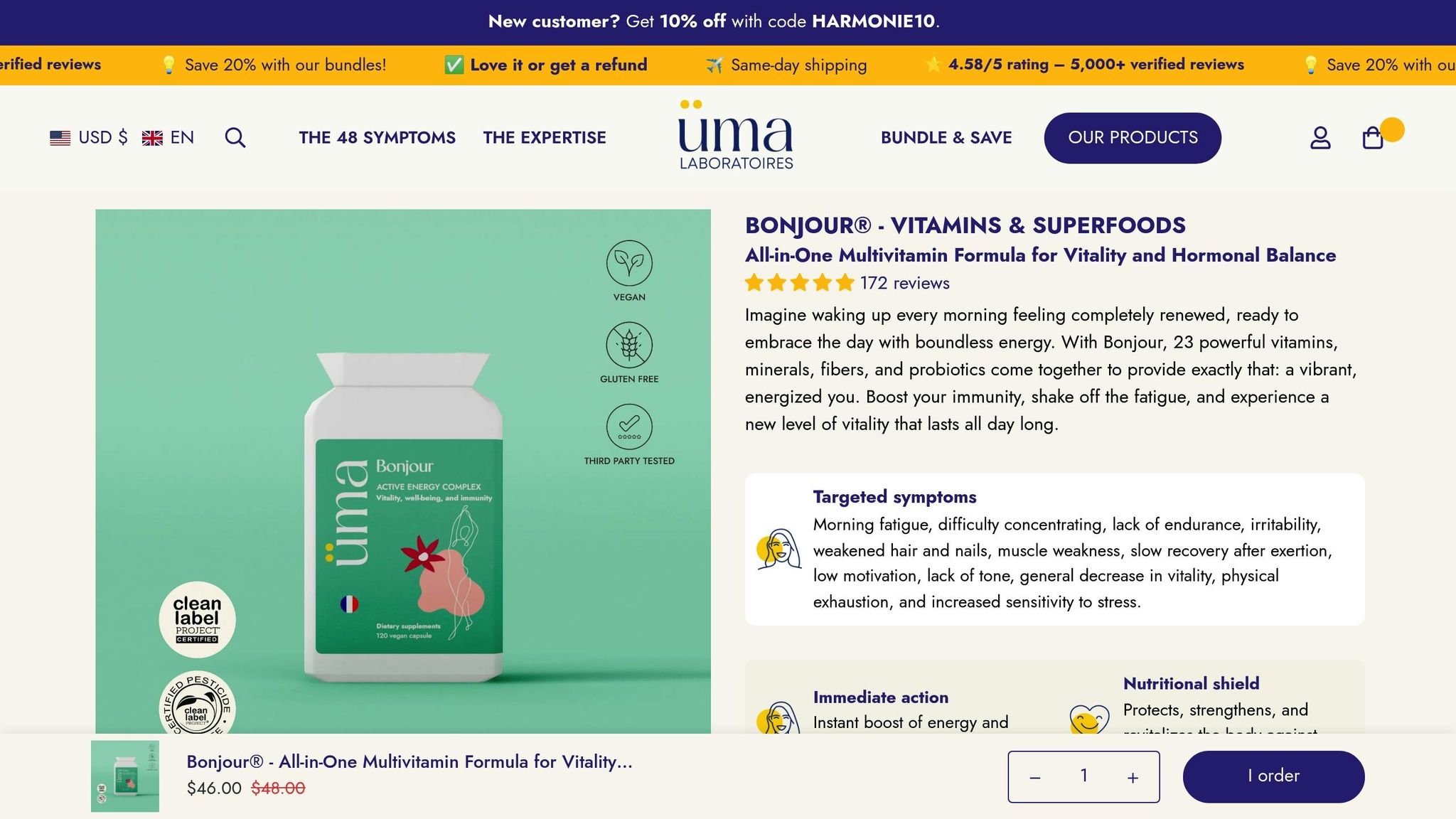Menopause-related fatigue can be exhausting, but a tailored diet can make all the difference. Here are the key points to get your energy back:
- Main Causes: Hormonal fluctuations, sleep troubles, iron deficiency, vitamin D and magnesium.
- Key Foods: Soy, flax seeds, cruciferous vegetables, whole grains, fatty fish.
-
Habits to Adopt:
- Stay hydrated (2 to 2.5 L/day).
- Plan your meals to keep your energy steady.
- Include B vitamins, magnesium, and zinc in your diet.
- Physical Activity: 150 minutes per week to reduce fatigue and improve sleep.
- Anti-stress: Techniques like mindful breathing and meditation.
Quick overview of essential nutrients:
| Nutrient | Main sources | Role in Energy |
|---|---|---|
| Iron | Red meat, lentils | Reduces anemia and exhaustion |
| Vitamin D | Fatty fish, eggs | Strengthens muscles and reduces fatigue |
| Magnesium | Almonds, pumpkin seeds | Boosts your energy production |
| B Vitamins | Poultry, green vegetables | Boost energy metabolism |
Adopt these solutions to navigate this transition more smoothly and lessen the effects of fatigue.
Menopause Fatigue: Natural Causes & Solutions
The Causes of Menopausal Fatigue
Nearly 85% of women experience noticeable fatigue during menopause. This transitional phase brings many changes that can affect everyday energy.
Hormonal Changes and Their Impact on Energy
Menopause causes a drop in estrogen levels, directly affecting your cells' energy metabolism. Mitochondria, known as the cells’ “powerhouses,” produce less ATP – the essential molecule that fuels your body. The result? A slower metabolism and noticeable energy swings throughout the day.
Nutritional Deficiencies: An Aggravating Factor
Some common nutritional deficiencies during menopause can worsen fatigue. Here’s a quick look at the nutrients often lacking and their effects:
| Nutrient | Prevalence among women | Effects on Fatigue |
|---|---|---|
| Iron | 20 % | Causes anemia and overall fatigue |
| Vitamin D | 40 % | Contributes to muscle weakness and increased fatigue |
| Magnesium | 80 % | Reduces energy levels and increases fatigue |
Sleep Troubles: A Vicious Circle
Sleep disruptions are another key factor in menopause-related fatigue. Here are some revealing figures:
- 80 % Menopausal women report having trouble sleeping well.
- 75 % suffer from night sweats that disrupt their sleep.
- The risk of developing sleep disorders is multiplied by 3 to 4 during this period.
These chronic sleep problems cause ongoing daytime fatigue, affecting your focus, mood, and even productivity. Next, we'll explain how a tailored diet can ease these effects.
Foods That Fight Fatigue
A well-thought-out diet can help keep your energy stable during menopause.
Hormonal Support Through Plants
Phytoestrogens, natural compounds found in certain foods, can help balance hormones and reduce fatigue. Legumes like soy, lentils, and chickpeas are excellent sources. Flaxseeds and sesame seeds also offer extra benefits by helping manage hormonal fluctuations.
Here are a few foods to prioritize to maximize these effects:
| Category | Foods | Benefits |
|---|---|---|
| Legumes | Soy, lentils, chickpeas | Rich in phytoestrogens and plant proteins |
| Seeds | Flax, sesame | Sources of omega-3 and lignans |
| Cruciferous vegetables | Broccoli, cauliflower, Brussels sprouts | Supports estrogen metabolism |
The Best Food Pairings
To maintain lasting energy, it's essential to combine the right macronutrients. A balanced meal includes complex carbohydrates (like whole grains and legumes), lean proteins (fish, poultry, tofu), and healthy fats (olive oil, avocado, nuts).
Some ideas for balanced meals:
- Breakfast: An oatmeal porridge topped with Greek yogurt and nuts.
- Lunch: A quinoa salad with grilled chicken, a variety of vegetables, and an olive oil vinaigrette.
- Dinner: Oven-baked salmon paired with sweet potato and steamed vegetables.
The Importance of Hydration
Not drinking enough water can make you feel even slightly more tired. During menopause, it’s best to drink between 2 and 2.5 liters a day, especially if you experience hot flashes or night sweats.
Some tips to stay well hydrated:
- Alternate between pure water and caffeine-free herbal teas, like mint, ginger, or chamomile.
- Incorporate water-rich foods into your meals, like cucumber or watermelon.
- Drink regularly throughout the day, and ease off on coffee in the evening.
We're now going to explore the essential nutrients that boost your energy.
Essential Nutrients for Energy
Some nutrients play a key role in producing cellular energy and help combat the fatigue often experienced during menopause.
B Vitamins and Their Energy Role
B vitamins are indispensable for turning food into energy, especially by activating mitochondria—the true powerhouses of cells.
| Vitamin B | Food Sources | Role in Energy |
|---|---|---|
| B6 | Poultry, fish, potatoes | Participate in the synthesis of neurotransmitters |
| B9 (Folate) | Green vegetables, legumes | Supports cellular metabolism |
| B12 | Eggs, dairy, meat | Helps produce energy |
After the B vitamins, let's focus on a mineral that's just as essential for keeping your vitality high: magnesium.
The Benefits of Magnesium
During menopause, magnesium needs increase. This essential mineral helps to:
- Stimulate the production of ATP (the main energy source for cells),
- Improve sleep quality through its role in melatonin production.
- Reduce muscle cramps, common during this time.
To meet these needs, add these magnesium-rich foods to your diet: almonds (210 mg/100 g), pumpkin seeds (535 mg/100 g), and cooked spinach (87 mg/100 g).
Finally, let's see how zinc and vitamin D complete this energetic picture.
The Zinc and Vitamin D Duo
Zinc and vitamin D work together to:
- Boost the immune system,
- Improve muscle function,
- Boost calcium absorption for strong, healthy bones.
Here are the main sources available in France:
| Nutrient | Food Sources | Recommended Intakes |
|---|---|---|
| Zinc | Oysters (24 mg/100 g), red meat | 8 to 11 mg per day |
| Vitamin D | Fatty fish, egg yolks | 800 to 1000 IU per day |
Adopting a balanced diet rich in these nutrients is a great strategy to counter menopause-related fatigue. If needed—especially in winter when sun exposure decreases—supplementation can be considered to meet specific needs.
Daily Habits to Reclaim Your Energy
Meal Timing
Adopting a regular meal schedule can be key to managing your energy, especially during menopause. It helps keep your blood sugar stable and prevents energy slumps throughout the day.
| Meal | Recommended Schedule | Ingredients |
|---|---|---|
| Breakfast | 7 a.m. - 9 a.m. | Proteins, fibers, and complex carbohydrates |
| Lunch | 12 PM - 2 PM | Vegetables, lean proteins, and starchy foods |
| Dinner | 7 p.m. - 8:30 p.m. | Light meal, eaten at least 2 hours before bed |
Such a pace, when paired with a varied and balanced diet, can really boost your vitality.
The Benefits of Physical Activity
Staying active is key to boosting your energy. According to the World Health Organization, 150 minutes of moderate exercise per week is ideal. You can break this up into 30-minute sessions over 5 days. Here are some activities to include in your routine:
- Brisk walk: 20 to 30 minutes a day for an activity that's easy to fit into your routine.
- Yoga or Pilates: 2 to 3 weekly sessions to strengthen the body and calm the mind.
- Swimming or cycling: 2 times a week for a gentle yet effective activity.
These regular exercises help reduce fatigue and promote restorative sleep.
Anti-Stress Methods
Stress can sap your energy reserves. Adding relaxation techniques to your daily routine can make a big difference:
- Conscious Breathing: Practice deep breathing for 5 to 10 minutes, morning and afternoon, to calm your mind and lower cortisol.
- Mindfulness Meditation: Take 10 to 15 minutes each day to ease anxiety and boost focus.
- Progressive relaxation: At the end of the day, try 15 to 20 minutes of progressive muscle relaxation to ease tension.
These practices, paired with a tailored diet and regular exercise, can help you effectively combat menopause-related fatigue and keep your energy levels high.
The Energy Solutions from Laboratoires üma

To help women overcome menopause-related fatigue, Laboratoires üma offers targeted nutritional solutions developed over 20 years of medical research. These solutions are part of a holistic approach designed to ease menopausal fatigue.
The Fatigue & Energy Loss Pack
This pack, designed to meet women's specific needs, combines natural ingredients for a synergistic effect. Available for €60, it includes:
| Component | Main Role |
|---|---|
| Adaptogens (Ashwagandha, Rhodiola) | Helps manage stress |
| Bioavailable iron | Reduces the risk of anemia |
| Vitamin B Complex | Boosts energy metabolism |
| Coenzyme Q10 | Boosts your energy production |
| Magnesium | Promotes quality sleep |
Bonjour®: Daily Essential Support

Designed to meet the unique needs of menopausal women, Bonjour® (35 €) provides complete daily energy support with a targeted formula:
- B Vitamin Complex: Helps maintain good energy metabolism.
- Vitamin D: Reduces fatigue and relieves joint pain.
- Zinc: Supports hormonal balance and boosts immunity.
- Ginseng and eleuthero: Provides lasting energy throughout the day.
Rigorous Quality Standards
The products Laboratoires üma meet the strictest standards thanks to:
- Tests conducted in independent laboratories.
- Using highly bioavailable ingredients.
- Formulas without synthetic hormones or unnecessary additives.
- The trust of over 30,000 healthcare professionals.
In summary
To effectively counter menopause-related fatigue, consider these key elements.
Hormonal fluctuations, especially the drop in estrogen and progesterone, directly impact your energy and sleep quality. To regain vitality, it's essential to follow a balanced diet rich in nutrients like iron, B vitamins, magnesium, zinc, and vitamin D.
Foods containing phytoestrogens, such as soy, flaxseeds, and chickpeas, can help keep your energy steady. Plus, proper hydration and well-planned meals help maintain balanced blood sugar throughout the day.
The products offered by Laboratoires üma, such as the Pack Fatigue & Perte d'Énergie and Bonjour®, provide targeted support through formulas specifically designed for menopause. These solutions highlight:
- Natural ingredients
- Adaptogens that work in synergy
- Proven effectiveness
In addition to these nutritional adjustments, regular physical activity, effective stress management, and quality sleep hygiene play a crucial role. By combining these good practices, you can sustainably regain your energy and well-being during this transition period.
FAQs
What foods should you choose to reduce fatigue during menopause?
To beat menopause-related fatigue, focus on a varied diet full of essential nutrients. For example, magnesium-rich foods like almonds, spinach, or legumes help maintain your energy. Omega-3s found in salmon, flaxseed, or walnuts boost your vitality. Plus, B vitamins in whole grains support your energy metabolism.
At the same time, exploring natural, tailored approaches can help you navigate this transition smoothly and maintain your everyday well-being.
How can I plan my meals to avoid fatigue and keep my energy steady during menopause?
How can you keep your energy steady all day?
To avoid fatigue and stay in shape, it's important to plan your meals carefully. Choose foods that deliver essential nutrients, such as:
- Lean proteins: fish, eggs, legumes.
- Complex Carbohydrates: quinoa, sweet potatoes, brown rice.
- Good fats: avocado, walnuts, olive oil.
Don't forget to add a healthy dose of fresh fruits and vegetables to enjoy their vitamins and minerals. In between meals, simple, nutritious snacks—like a handful of almonds or a plain yogurt—can help keep your energy up.
Finally, stay well hydrated throughout the day and cut back on processed foods high in simple sugars. They may provide a quick burst of energy, but they can cause sharp energy crashes later. A balanced, thoughtful diet is the key to staying in shape!
What are the effects of adaptogens like Ashwagandha and Rhodiola on menopause-related fatigue?
Adaptogens: Natural Support for Menopause
Adaptogenic plants, like Ashwagandha and Rhodiola, are known for their ability to help the body better handle stress and restore balance. These plants play a key role in reducing feelings of fatigue—often heightened during menopause—by supporting energy levels and boosting stress resilience.
At Laboratoires üma, we focus on natural, science-backed solutions to support women during this transition. While this article covers broader nutritional approaches to combat menopause-related fatigue, our products are specifically formulated to meet the unique needs of this stage, blending effectiveness with gentleness.






